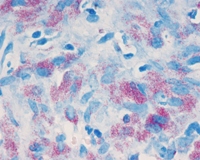
(MACPCR, Mycobacterium avium-intracellulare complex PCR)
Members of the Mycobacterium avium-intracellulare complex are acid fast bacilli that can cause tuberculosis-like disease, localized lymphadenitis, gastrointestinal disease, and disseminated infections. Acid fast bacilli can be very difficult to grow due to their nutritional requirements. Some specimens may never reveal the presence of a pathogen because of low abundance and/or lack of viability. The use of PCR to detect Mycobacterium avium-intracellulare complex DNA extracted directly from clinical specimens facilitates the identification of these pathogens.
For an accurate detection of the presence of MAI complex in clinical specimens, the UWMC Molecular Diagnosis Section utilizes fluorescence resonance energy transfer (FRET) probes in a nested PCR protocol that targets heat shock protein 65 gene (hsp65). Utilization of MAI complex specific fluorescent probes on a real-time PCR platform facilitates rapid and highly sensitive detection of MAI complex DNA in clinical specimens.